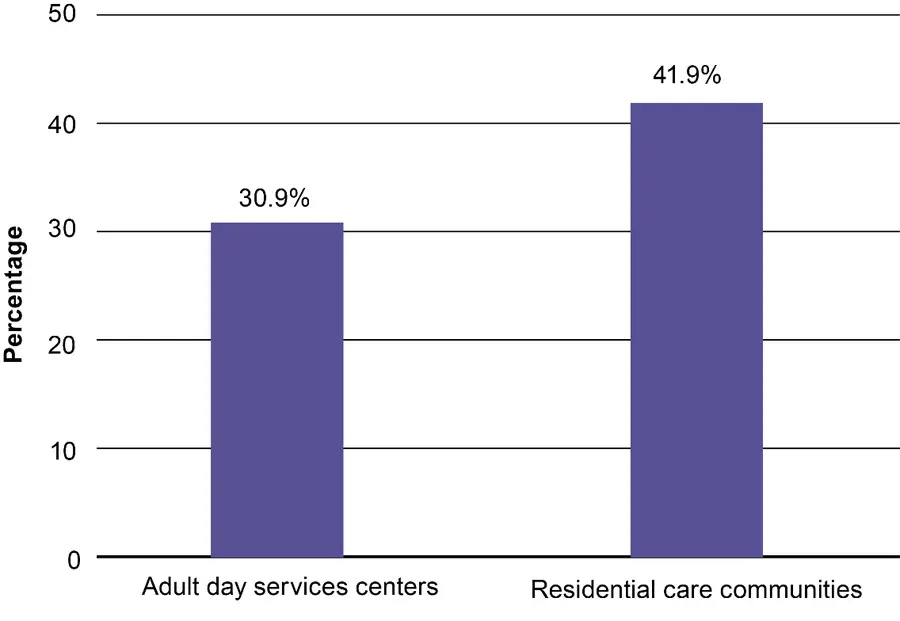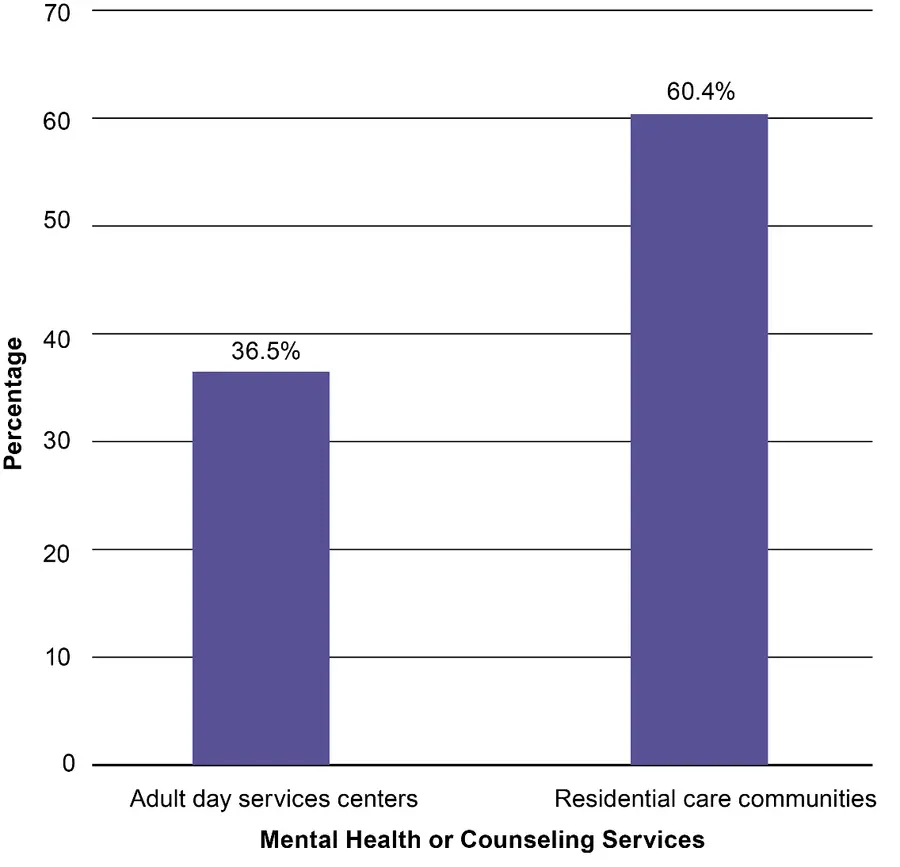The National Post-acute and Long-term Care Study (NPALS) gives insights into residential care communities and adult day service centers, including the impact of COVID-19
Objective
Understanding the range of long-term services and supports (LTSS) needed and the current supply of non-institutional services available in the U.S. allows policy makers, researchers, and provider organizations to track trends and gaps in services.
Approach
RTI conducts a biennial survey of providers as part of the National Post-acute and Long-term Care Study (NPALS) to learn more about the current supply of residential care communities and adult day services centers and how they are meeting the long-term care needs of an aging population.
Impact
The NPALS survey results are used by the Centers for Disease Control and Prevention’s (CDC’s) National Center for Health Statistics (NCHS) to produce publicly available, national overview reports on trends in the supply of long-term care providers and long-term care service use.
LTSS Trends and Preferences of an Aging Population
The U.S. population is aging rapidly and the demand for a range of long-term services and supports—such as assistance with activities of daily living, skilled nursing services, and dementia care—is increasing. Between 2020 and 2060, it is expected that:
- The number of people aged 65 and older will almost double
- The number of people aged 85 and older will almost triple
- More than half of the people under the age of 65 will become disabled enough to need LTSS.
Most older adults and persons with disabilities prefer to receive long-term services and supports in their own homes and attend adult day services when appropriate and available. When these options are not possible, the preference for long-term care is for other non-institutional settings, such as assisted living or other residential care communities.

Residential Care Communities and Adult Day Services Centers
What are residential care communities?
Residential care communities (RCCs) are residential care settings, such as assisted living facilities, that provide long-term services and supports in a homelike setting. These places range in size from small residential care homes with fewer than 10 beds to large assisted living communities with 100 or more beds.
What are adult day services centers?
Adult day services centers provide social and, in some cases, health-related services to older and disabled adults who need care and oversight during the day while their caregivers work or take a break from caregiving duties. These services are provided in a community-based setting outside the participant’s home.

Monitoring Long-Term Services and Supports Trends Using Longitudinal Data Collection
Since 2012, RTI has been supporting CDC’s National Center for Health Statistics’ (NCHS) objective to learn more about RCCs and adult day services centers by conducting a biennial survey of these providers as part of the National Post-acute and Long-term Care Study (NPALS)—formerly the National Study of Long-Term Care Providers (NSLTCP).
The 2012–2016 data collection waves included a large sample of RCCs and adult day services centers. In 2018, NCHS added a resident and participant survey to the study to obtain detailed information about the long-term care needs of older adults and persons with disabilities and the services they use. In 2020, questions were also added to help understand the impact of COVID-19 on RCCs and adult day services centers.
RTI and the NCHS Biennial Study of Long-Term Care Services
As a research institute with a wide range of subject matter and technical experience in aging, disability, and long-term care, RTI supports survey design, methodology development, and data collection for this important biennial study. RTI’s role includes:
- Developing the national sampling frame for RCCs
- Providing substantive input into questionnaire development
- Supporting instrument design
- Conducting the NPALS mixed mode survey with administrators and directors every two years
- Using Web, mail, and computer-assisted telephone interviewing to conduct the survey.
About the NPALS Survey
The survey asks for background information about the facility, types of services offered, and staffing information. In alternating years, beginning in 2018, the survey collects background information on residents of RCCs and participants in adult day services centers, including their characteristics, health, disability status, and services used.
RTI’s work supports the growing evidence base of COVID-19 impacts
At the beginning of the COVID-19 pandemic, residents and staff of assisted living and other types of residential care communities were highly vulnerable to infection. In the summer of 2020, just prior to the scheduled survey launch, RTI worked with NCHS to quickly integrate new questions to collect data on the impact of COVID-19 on RCCs and adult day services centers. NPALS became the first national study to collect COVID-related data from these providers.
Pandemic response affects LTSS providers, residents, and participants
During the pandemic, RCCs and adult day services centers made adjustments in an effort to control the spread of the coronavirus.
- Many residential care communities went into lockdown, limiting visitors and services provided by outside agencies.
- There were prolonged closures for adult day services centers.
- Many centers had to find other ways to provide services, e.g. by telemedicine, if they were able to offer services at all.
How the COVID-19 Pandemic has Affected Access to Long-Term Care Services
The pandemic, and the response to it, affected the delivery of LTSS and the lives and health of providers and participants. Preliminary results on COVID-related data collected from the 2020 survey are available on NCHS’ Long-term Care and COVID-19 dashboard. They reveal the number of COVID-19 cases, hospitalizations, and deaths among RCC residents and adult day service center participants. The dashboard also provides national and regional estimates on the impact of the pandemic on provider staff.
NPALS Data Helps Policymakers and Researchers Understand LTSS Needs and Current Supply
NCHS uses the NPALS survey results to produce various publicly available materials. These include:
- National overview reports on trends in the supply of long-term care providers and long-term care service use
- Sector-specific national reports and data briefs
- State estimates maps, tables, and figures
- Journal articles
- Presentations.
Public Use datasets from certain data collection waves are available for states, policy makers, and researchers to use. Researchers can also work with datasets from more recent data collection waves within the NHCS Research Data Center. Figures 1 and 2 are examples of the types of information available using the NPALS data from surveys developed and conducted by RTI.
Figure 1: Percentage of Residential Care Community Residents and Adult Day Services Centers Participants with Alzheimer's Disease and Other Dementias, 2015-2016
Figure 2: Percentage of Residential Care Communities and Adult Day Services Centers that Provide Mental Health Counseling Services, 2017-2018
Learn about RTI’s health care transformation capabilities.
- Centers for Disease Control and Prevention






